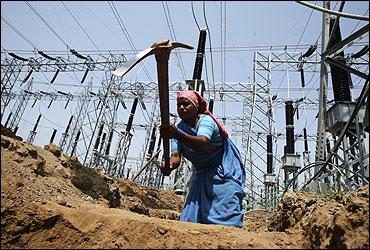
One of the most prickly nettles for governments in India today is land acqusition for industry. The Centre is drafting a new Bill on the issue, but land is a state subject, and different states have different land acquisition policies. The Bill can at best provide an enabling framework. In the first of a two-part series, Business Standard takes a look at the scenario in Orissa, West Bengal, Chhattisgarh and Andhra Pradesh
Industrial projects require sizeable tracts of land. But land is an emotive issue in an agrarian country and people are not willing to cede the land on which they grew up - more so, when farmers feel they are not getting the right price for it.
And for many, the dilemma is what to do for a living after selling their land.
No wonder, attempts to acquire large tracts of land have met with opposition across states, from the struggle of tribals at Niyamgiri or farmers against Posco in Orissa, Singur and Nandigram in West Bengal (the poor handling of which cost the Left Front the state elections in 2011), or the protests at Jaitapur in Maharashtra.
"People are emotionally attached to their lands. Protests will always be there whenever there is an attempt to acquire people's land," said Orissa's minister for revenue and disaster management, S N Patra.
But the protests have more to do with poor compensation, and now farmers are bargaining hard. This has forced a national debate on the issue.
The National Advisory Council, a body headed by Congress President Sonia Gandhi, wants the government to acquire land wherever it displaces more than 400 families, but only if it has the consent of 70 per cent of the affected people (including landless).
The government is also drafting a new land acquisition Bill.
Click on NEXT for more...
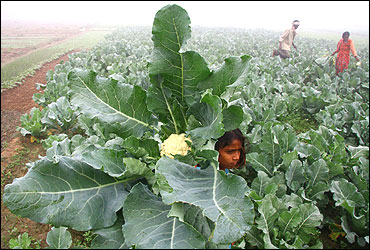
The increasing protests from farmers have forced states to rethink their land acquisition policies.
Many states have gone slow on acquiring land for industry - including some like Chhattisgarh, which is left with virtually no land bank, while others like West Bengal have said clearly that they will not acquire land for industry.
Uttar Pradesh unveiled a new land acquisition policy in June which promises a better deal for farmers and encourages private companies to acquire land directly.
States that acquire land based on market prices or those which promote industry on waste lands have seen fewer protests.
Even as the Centre drafts a new land acquisition Bill and examines NAC's proposals, there is a new debate on its scope and the extent to which it would be binding on states.
Given that land is a state subject, many experts believe the new law could at best provide an enabling framework to enable the states to enact their own laws.
Even as the issue gets debated and more clarity emerges in the days ahead, Business Standard takes a look at land acquisition policies in some of India's major states. These differ across states, and are still evolving.
Click on NEXT for more...
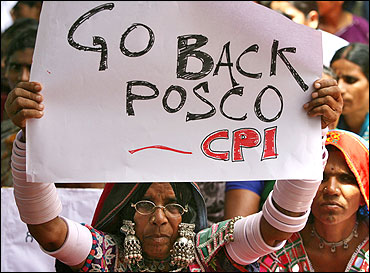
Orissa
Orissa does not have a land acquisition policy of its own, and land is acquired according to the prevailing Land Acquisition Act of 1894.
The state has a comprehensive Rehabilitation & Resettlement (R&R) Policy, 2006.
S N Patra, the state minister for revenue, says the state R&R policy is unique, as "other states do not have a full-fledged R&R policy like Orissa or separate and well-defined rehabilitation provisions for industrial, mining, irrigation or road projects".
The policy allows the project proponent to opt for direct purchase of land on the basis of a negotiated price after the state issues a notification.
It prescribes that land not utilised by the project within the prescribed time limit, and for the purpose it was acquired for, must be returned.
Click on NEXT for more...
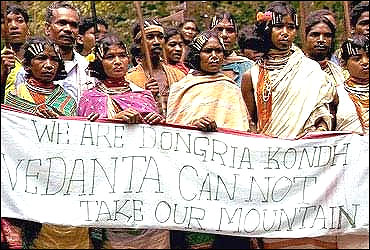
In the case of industrial and mining projects, the displaced family could take 50 per cent of the one-time cash assistance in the form of convertible preference shares or secured bonds from the project authority.
Unlike other states that offer employment only to people who lose their entire land, Orissa provides jobs for five categories of land losers - families losing all their land, those losing two-third of it, one-third of it, and others.
"The rate of compensation is decided at the meeting of the Rehabilitation & Peripheral Development Advisory Committee after due consultation with the land losers," said a senior official of the Industrial Infrastructure Development Corporation (Idco), the state's nodal agency for land acquisition.
In Orissa, projects that need relatively less land have encountered few problems, whereas big-ticket projects like those of Tata Steel, Posco, Arcelor-Mittal and Vedanta University, with land requirements ranging from 3,000 acres to 6,000 acres, are stuck in a mire of local protests, political opposition and procedural delays.
Click on NEXT for more...
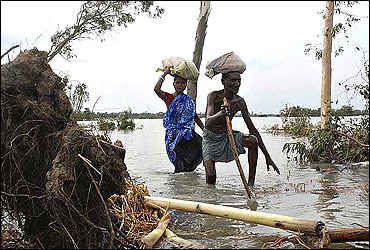
West Bengal
The Trinamool Congress-led West Bengal government has decided not to acquire land for industrial projects.
A two-member expert committee has recommended direct purchase for industrial projects, and this holds for public sector undertakings (PSUs) as well.
In fact, NTPC has been told that no land will be acquired for its 1,600-Mw power project. The project has just 478 acres acquired by the previous government.
The government will however acquire land for infrastructure projects and has begun acquisition for embankments in the Sundarbans.
West Bengal doesn't have a land policy, but recommendations for one have been submitted and a policy is now being formulated.
The previous government pursued both routes - it allowed companies to acquire land as well as acquired land for them - but greater emphasis was laid on acquisition by the state.
Click on NEXT for more...
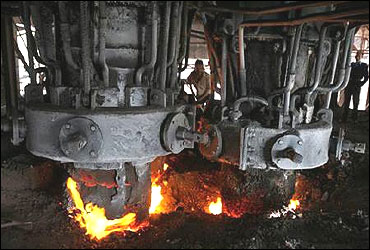
But companies have faced problems in acquiring land in the past five years.
The West Bengal Industrial Development Corporation (WBIDC) began purchasing land directly for Tata Metaliks' steel project, but prices rose to unviable levels and the company relocated its project to Karnataka.
Bhushan Steel has been trying to acquire 100 acres at Sankrail for its cold rolling project and has managed 80 acres in the last four years.
The company has plans for a six-million-tonne project, but would like the government to facilitate land acquisition.
The problem in Bengal is that only one per cent of land is fallow and it is fragmented.
The average land holding is less than an acre, making it impossible for companies to acquire large tracts.
The only big success has been JSW Steel, which directly acquired 450 acres at Salboni for its 10 million tonne project, but that was mostly barren and the remaining 90 per cent of its requirement was vested with the government.
Click on NEXT for more...

Chhattisgarh
The only change that the Chhattisgarh government has made in its land acquisition policy is an increase in the compensation rate last year.
As in other states, the policy ensures one job for each project-affected family and a house for the rehabilitated.
The state government has increased the rate for double-crop irrigated land from Rs 500,000 per acre to Rs 10 lakh (Rs 1 million), for single-crop irrigated land from Rs 300,000 to Rs 800,000, and for un-irrigated from Rs 200,000 to Rs 600,000 per acre.
A company has to submit a requisition to the government, and land will be acquired and allotted by the Chhattisgarh State Industrial Development Corporation (CSIDC).
Click on NEXT for more...

The state government is not acquiring any more land for companies.
The land bank with the CSIDC is nearly empty and there is no land in its possession that can be allotted to any company.
Two years ago, the government acquired about 422 acres for GMR's power station, coming up near Raipur. GMR purchased the remaining 428 acres that it needed directly from the villagers.
The Tatas had inked an agreement with the state government in June 2005 to set up a 5.5-million-tonne steel plant in Bastar.
Six years have passed, but the government has failed to acquire the 2,161 hectares required. Possible protests from the Naxalites (who are active in Bastar) have slowed the process.
Click on NEXT for more...
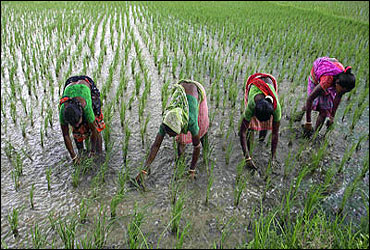
Andhra Pradesh
Andhra Pradesh has been the most liberal state in the matter, allowing purchases of farm land for non-agricultural purposes.
Private persons and companies have been purchasing land directly from farmers in addition to that acquired through government agencies or the revenue department.
Andhra has 75 notified SEZs, the highest number in any single state in the country.
Most of the land allotments to companies and private industrial parks took place during the term of Y S Rajasekhara Reddy (YSR) as chief minister from 2004 to 2009, because government land was available in abundance.
When YSR saw problems in land acquisition elsewhere, his government silently switched over to the 'consent award' mode, where the government issued a notification for land acquisition while the beneficiary directly negotiated with farmers.
This policy was used to acquire large chunks of land for SEZs in Nellore, Chittoor and Kakinada.
Click on NEXT for more...
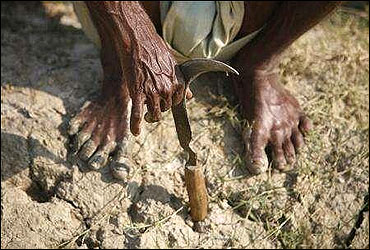
The current government is planning to bring in a land allotment policy based on industry's actual requirements.
Except for this change, land acquisition still remains a one-time compensation given to the farmer, depending on the location and the bargaining capacity of the two sides.
This is because there is no defined R&R policy in the state.
The state has had its share of protests.
There were violent protests by farmers and villagers against two thermal power projects in coastal Srikakulam district.
One of them was shifted to Krishnapatnam in Nellore district, while the other was scrapped after some local villagers died in police firing.